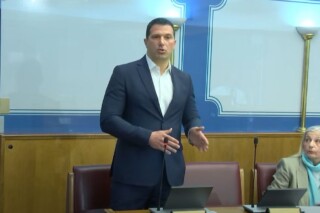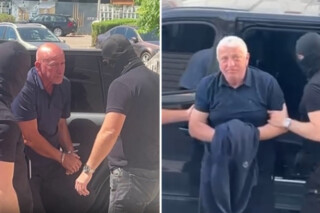Recent events related to the Law on Freedom of Religion escalated rapidly into a political clash with the State and its sovereign right to solve the internal issues, Montenegro Defense Minister, Predrag Bošković, told in an interview with Pobjeda, a daily. Minister Bošković noted that despite all that, the Government of Montenegro won’t tolerate the escalation in protests or any other kind of threats.
Here are the highlights of the interview with Minister Bošković…
Did the security situation in Montenegro require the engagement of the Army of Montenegro, having in mind current events and tensions in the country?
BOŠKOVIĆ: The security situation in Montenegro has been stable. Relevant state bodies, primarily the National Police and its staff, are closely monitoring the situation and will do everything to make every citizen of this country, regardless of their religious, national or political affiliation, feel safe in doing their everyday activities.
The Government of Montenegro again called for the Metropolitanate of Montenegro and the Littoral to have dialogue. Do you think a compromise can be reached? Is the Govt ready to make it?
BOŠKOVIĆ: The Religious Freedom Law has been passed and now follows its implementation. As we have already indicated for several times, the Government of Montenegro is always, ready to engage in a dialogue. The Law doesn’t aim to create divisions, on the contrary – it strives to remove any cultural or religious limitations we were part of, and ensure equal rights for all religious communities in Montenegro.
The Govt has already expressed willingness to have dialogue with the MCP, as well as the readiness to find the best possible solutions for the implementation of Articles 62-64 of the Law.
…
Do you think it’s necessary to talk with representatives of Serbian authorities in order to ease tensions between the two countries in the light of harsh words we often hear from SRB?
BOŠKOVIĆ: Montenegro has been recognized as the factor of stability in the region because we were always ready to solve all the unclear issues in a peaceful manner and through dialogue. The current state of affairs between Montenegro and Serbia is not satisfactory, mostly due to the inappropriate messages coming from the highest representatives of the Serbian authorities in Belgrade. Montenegro is always ready for talks in order to maintain good neighborly relations, just as was the case so far.
…
Have you discussed the situation in MNE with the NATO Allies? If you have, what messages did you get?
BOŠKOVIĆ: We have been continuously discussing all the challenges before Montenegro with our NATO partners. As we have already informed the public, the NATO’s counter-hybrid support team was in Montenegro at the end of November 2019. The team was set up in order to provide tailored targeted assistance to NATO member states and Montenegro was the first Ally to host them.
…
Montenegro is currently facing a series of a quite intensive disinformation campaign from Serbia, backed by radical elements at the political and religious stage of Montenegro, and that is why we required the expert support from our partners. Our aim was to strengthen the national capacities for detecting and understanding threats, and more efficient coping with them. Experts from NATO member states gave some very useful advice and guidelines that will help us in further strengthening of the institutional capacities for dealing with hybrid threats, as well as in drawing up the relevant legislative framework in this area.
Can current tensions stirred by protests over the adoption of the Religious Freedom Law become more serious?
BOŠKOVIĆ: The Government of Montenegro made a point of being clear about this matter – it won’t tolerate an escalation of protests or conflicts. It seems that, even 14 years after Montenegro renewed its independence, we have to repeat that MNE is an independent country of all its citizens and a NATO member state. The opposition has to know that political discussions should be led in a parliament, not in the streets.
The Government approves of any kind of protest aiming to reach a legitimate, constructive and democratic way of expressing views and opinions for better quality of life of citizens. When it comes to the negative pressures and events, Montenegrin bodies have already shown readiness to protect the Montenegrin constitutional and legal order.
…
The Ministry of Defense announced a public call for voluntarily military service. Are the young in MNE interested to take part in the work of the Army?
BOŠKOVIĆ: …
As for the project itself, I’d particularly like to stress the fact that we had three times more applicants than required in the announcement, which really tells a lot about the interest of the young people in this program.
As it’s about a new project and successfully completed professional development programs, we believe the figures will be even higher in future.
…
What especially makes us happy is the data that more women wish to apply to the project, as the Ministry of Defence and the Army of Montenegro, being the institutions that successfuly implement the gender equality policies, particularly take care of this matter.
…
Is it true that the Govt established a counter-hybrid warfare team?
BOŠKOVIĆ: The Government set up an interdepartmental team comprising the representatives of competent state bodies. The aim of the team is to monitor and coordinate the activities related to strengthening the institutions of the system and capacities for understanding and dealing with hybrid threats. The interdepartmental team will be cooperating with NATO in order to share best practice.
…




